Top AI Learning Courses in Australia (2025): Certified Programs You Can Start Today
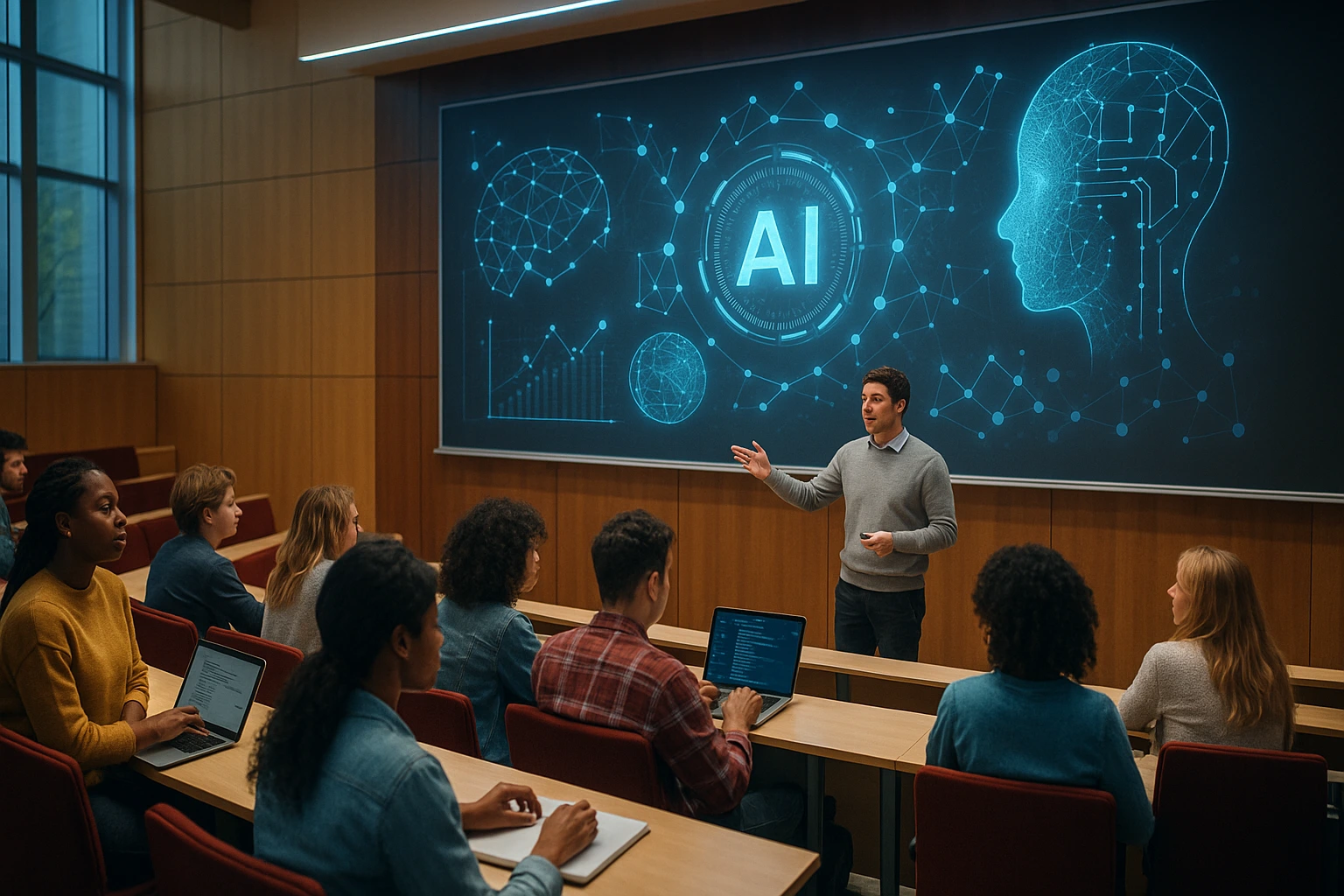
In 2025, Australia stands at a digital turning point. Artificial intelligence is no longer a research frontier it powers customer service at the Commonwealth Bank, underpins mining automation in WA, and drives personalised learning in classrooms across Victoria.
Yet, the workforce is struggling to keep up.
According to the Department of Industry, Science and Resources (DISR), Australia will require around 160,000 AI-literate workers by 2030, while fewer than 25 per cent of employees today can confidently use AI tools at work. The government’s National AI Strategy 2025 identifies this shortage as a critical national risk.
Universities, TAFEs, and ed-tech platforms are responding fast. From Melbourne’s RMIT and Monash to online providers like Coursera and DeepLearning.AI, an entire ecosystem of AI learning has emerged offering credentials that move beyond theory to hands-on, industry-aligned experience.
Why AI Learning Has Become Australia’s Most Valuable Career Investment
The global AI market surpassed US $1 trillion in 2025, and Australian organisations are embedding automation at record speed.
- LinkedIn’s Economic Graph 2025 reports a 37 per cent year-on-year rise in AI-related job postings.
- Hays Recruitment 2025 lists machine-learning engineer among the top five fastest-growing tech roles in the country.
- Salaries for AI specialists now average AUD 140 k – 160 k, with senior engineers earning well over AUD 180k.
Australia’s AI Education Ecosystem
Unlike the United States or the EU, Australia’s AI education network is deliberately collaborative.
- The National AI Centre (NAIC) partners with CSIRO Data61 and Microsoft Australia to co-fund applied research.
- TAFE NSW and RMIT Online deliver micro-credentials that feed directly into university degrees.
- Coursera for Government programs are subsidised under Digital Skills for the Future, giving regional Australians access to world-class AI content.
This blended system combining public funding, private-sector content, and formal accreditation means learners can start free and scale up to postgraduate study without losing credit recognition.
Top AI Learning Courses in Australia 2025
1️⃣ RMIT Online Artificial Intelligence Microcredential
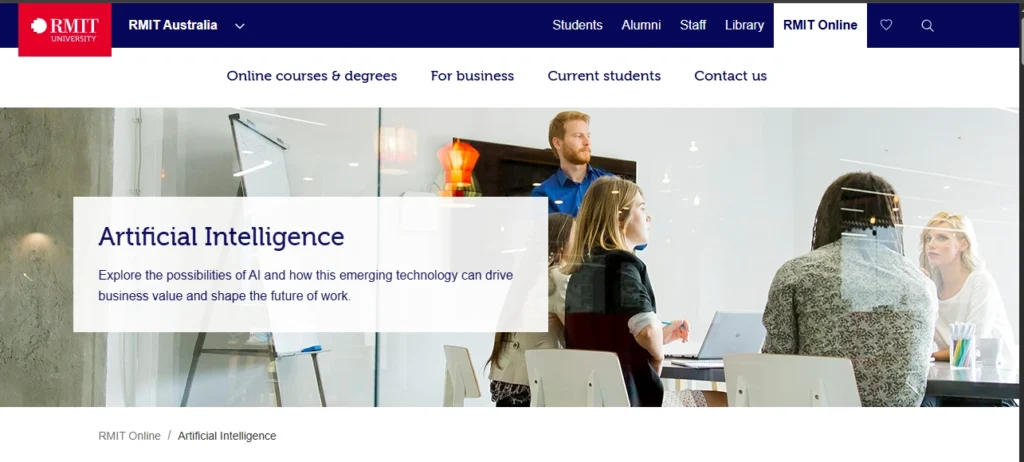
Duration: 6 weeks (part-time) Cost: ≈ AUD 1,600 Level: Beginner → Intermediate
RMIT Online’s flagship AI short course, created in collaboration with Accenture Australia and IBM, is built for professionals who want to apply AI rather than just understand it.
Curriculum highlights
- Introduction to Machine Learning & Neural Networks
- Python for Data and AI
- Building Predictive Models
- AI Ethics and Bias Mitigation
- Capstone Industry Project
Students use TensorFlow, OpenAI API, and Scikit-learn to solve a real-world dataset problem. Graduates earn an RMIT Credential mapped to the AQF Level 8 framework.
📍 Why it matters: This program is widely recognised by employers because it teaches deployable skills, not academic theory a perfect mid-career pivot point.
2️⃣ TAFE NSW Introduction to Artificial Intelligence
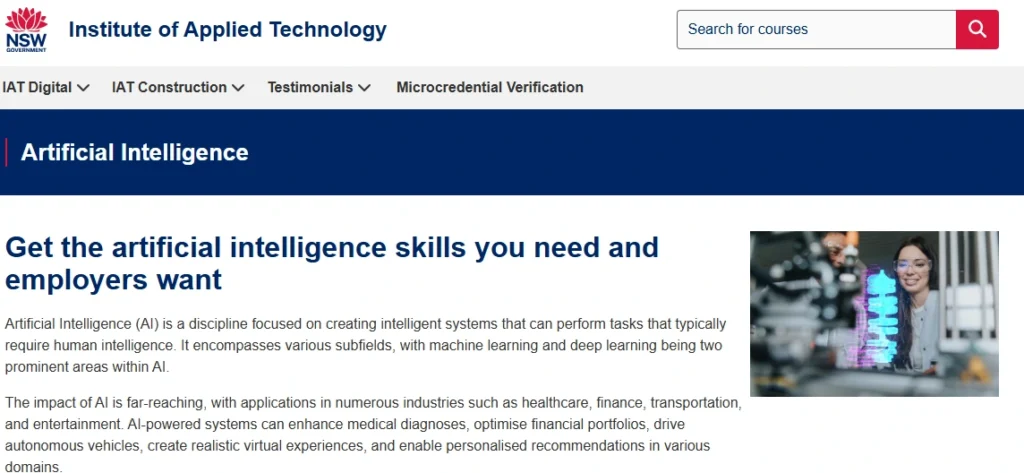
Duration: 10 weeks Cost: ≈ AUD 580 Mode: Online or Hybrid
Part of the NSW Government’s Digital Foundations Initiative, this entry-level course introduces non-technical professionals to AI automation and compliance.
What you’ll learn
- Fundamentals of Machine Learning and Generative AI
- Implementing no-code AI tools for business automation
- Data privacy and the Australian AI Ethics Framework
- Managing AI risk within small enterprises
Outcome: Graduates receive a Statement of Attainment under the NSW Skills Program a credential recognised across all TAFEs.
📍 Why it matters: One of the few affordable programs addressing AI governance and responsible use, not just technology.
3️⃣ University of Sydney Master of Artificial Intelligence
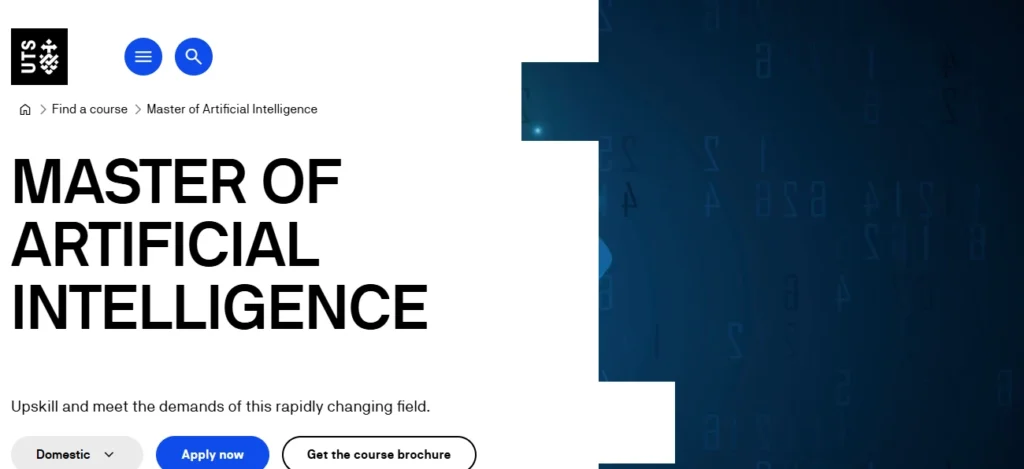
Duration: 1.5 – 2 years Cost: AUD 42 k (domestic) / 53 k (international)
Australia’s oldest university hosts one of its newest tech degrees. The program is developed with CSIRO Data61, providing access to national research projects and internship pathways with Microsoft Research Asia.
Course modules
- Deep Learning and Neural Networks
- Computer Vision and Robotics
- Natural Language Processing
- AI for Policy and Governance
- Applied Research Thesis
Graduates report 92 per cent employment within six months.
📍 Why it matters: Sydney’s focus on policy and ethics positions it as the go-to degree for those aiming to lead AI governance or R&D teams.
4️⃣ Monash University Graduate Diploma in Artificial Intelligence
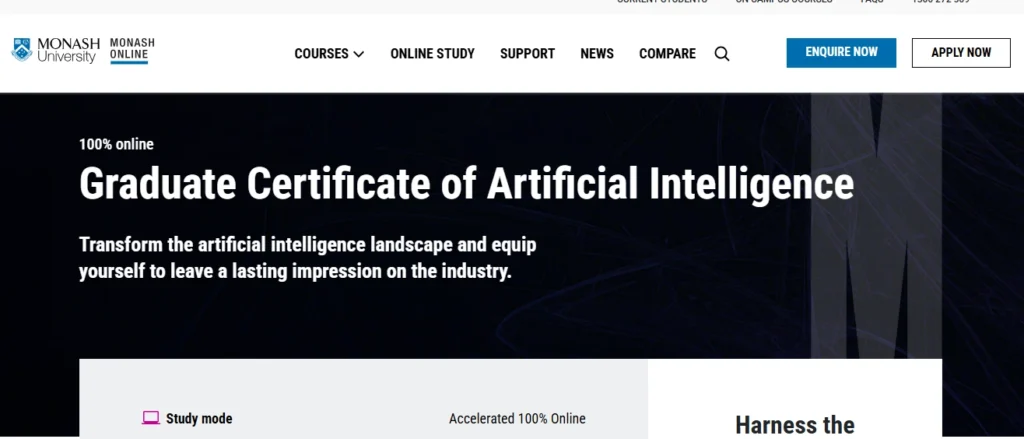
Duration: 12 months Cost: ≈ AUD 39 ,800 Mode: Hybrid
Monash pairs data-science rigour with business relevance. The diploma is run through the Monash Data Futures Institute, where students analyse live industry datasets from partners such as NAB and Telstra.
Core units
- Reinforcement Learning and Predictive Modelling
- AI Systems Design
- Responsible AI Frameworks
- Capstone Project with Industry Mentor
📍 Why it matters: Bridges the gap between a computer-science degree and the new reality of AI-enabled workplaces.
5️⃣ University of Melbourne Master of Machine Learning & Computer Vision
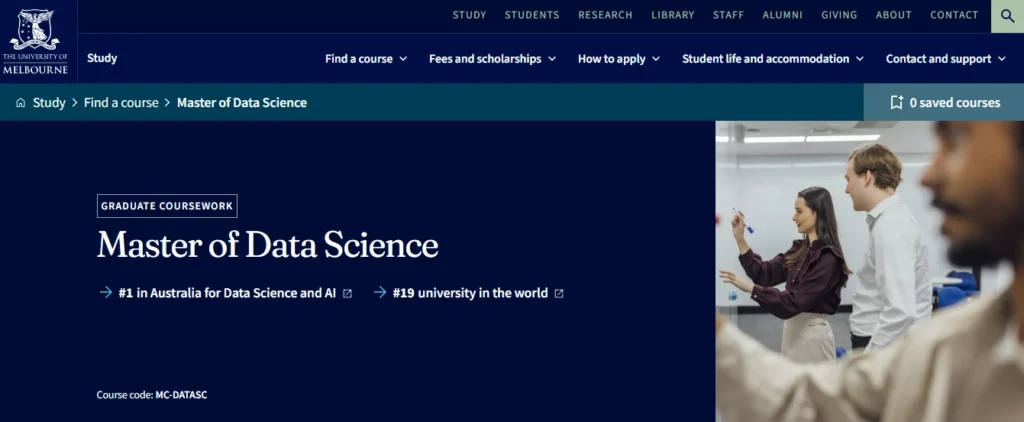
Duration: 2 years Cost: ≈ AUD 51,000
Backed by the Melbourne Centre for AI Innovation, this degree dives deep into algorithmic modelling and visual computing.
Subjects include
- Advanced Statistical Learning
- Computer Vision and Perception
- AI for Autonomous Systems
- Research Thesis Project
📍 Why it matters: The course prepares graduates for PhD research or high-end R&D roles within robotics and defence technology sectors.
6️⃣ UNSW Sydney Graduate Certificate in Data Science and Decisions
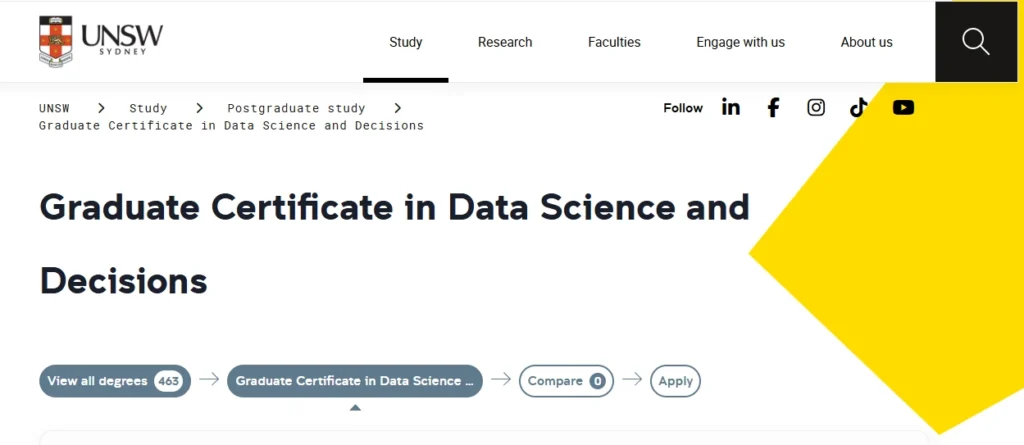
Duration: 8 months (online) Cost: ≈ AUD 22k
Useful for mid-career professionals, UNSW’s online certificate blends machine learning with business analytics.
Learning path
- Machine Learning Fundamentals
- AI for Decision Support
- Data Visualisation & Storytelling
- Applied Industry Capstone
📍 Why it matters: Recognised by the Australian Computer Society (ACS) and mapped to global data-science competencies.
7️⃣ Deakin University Bachelor of Applied Artificial Intelligence
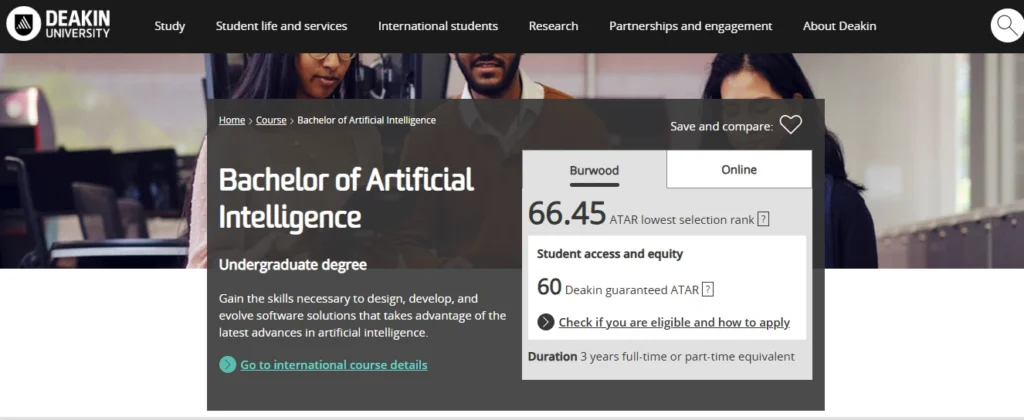
Duration: 3 years Cost: ≈ AUD 39 k per year
Deakin’s program is one of the first undergraduate degrees in applied AI. Students explore robotics, IoT integration, and AI ethics, gaining accreditation with Engineers Australia.
📍 Why it matters: Hands-on laboratories and industry placements create direct pipelines to manufacturing, logistics, and automation roles.
Free and Global Online AI Courses
1️⃣ Google AI & Machine Learning Specialisations (Coursera)
Duration: Self-paced Cost: Free (audit)
Google on Coursera includes Machine Learning Foundations, TensorFlow for AI, and Responsible AI.
Great for beginners wanting a globally recognised certificate.
2️⃣ IBM AI Engineering Professional Certificate
Duration: 3 – 6 months Cost: AUD 65 / month
IBM Certificate overs six courses spanning ML to model deployment with Flask.
Ideal for data scientists seeking an enterprise-grade credential.
3️⃣ OpenAI + DeepLearning.AI Prompt Engineering Course
Duration: 2 – 3 hours Cost: Free
Teaches prompt design for GPT-4 and multimodal AI systems.
Over 500 k completions globally in 2025.
4️⃣ FutureLearn Introduction to AI by The Open University
Duration: 4 weeks Cost: Free / AUD 129 with certificate
Covers ethics, applications, and the future of AI work.
5️⃣ Udemy Python for AI & Machine Learning Bootcamp
Duration: 45 + hours Cost: ≈ AUD 89
Practical projects in Python, Keras, and scikit-learn.
Career Outcomes & Salary Outlook (2025)
| Role | Average Salary (AUD) | Growth YoY |
| AI Engineer | 140 k – 160 k | +28 % |
| Data Scientist | 115 k – 145 k | +22 % |
| Machine Learning Specialist | 130 k – 155 k | +30 % |
| AI Consultant | 100 k – 130 k | +18 % |
| Research Scientist | 120 k + | +25 % |
(Hays Salary Guide 2025 / LinkedIn Workforce Insights)
Beyond pay, graduates gain adaptability the ability to design prompts, automate workflows, and analyse ethical implications skills employers now view as core digital literacy.
Choosing the Right Path
- For beginners: Free online courses from Google or OpenAI build confidence without cost.
- For professionals: Micro-credentials like RMIT Online or UNSW Online deliver job-ready projects.
- For career changers: Full postgraduate degrees (Sydney, Monash, Melbourne) provide credibility and research depth.
- For organisations: Corporate cohorts through Coursera for Business or TAFE Enterprise scale staff capability.
Before enrolling, verify:
- AQF recognition or international equivalent
- Industry partnerships (look for IBM, AWS, Microsoft tie-ins)
- Hands-on projects that demonstrate real AI outputs
Australia’s 2025 AI Learning Trends
- Government investment: AUD 64 million allocated to AI education partnerships via the AI Industry Growth Centre.
- Corporate academies: Telstra, Canva, and Qantas have internal AI upskilling programs.
- Gender diversity: Female enrolments in AI courses up 42 % since 2023.
- Regional access: TAFE NSW and Charles Sturt University deliver AI micro-degrees to rural communities via virtual labs.
These initiatives mark a shift from tech-centric training to AI literacy for all positioning Australia among the top five nations for inclusive digital education.
Final Thoughts
Australia is no longer watching the AI revolution it’s building it.
From RMIT’s corporate-aligned short courses to the University of Sydney’s research labs, every learner now has a pathway to join the digital economy shaping the decade ahead.
AI education in 2025 is no longer optional career insurance it’s the currency of innovation.
FAQs
Which AI course is best for beginners?
Google’s Machine Learning Foundations and OpenAI’s Prompt Engineering are ideal entry points.
Which universities offer recognised AI degrees?
RMIT, Sydney, Monash, Melbourne, UNSW and Deakin offer accredited AI programs under AQF standards.
Can I learn AI without coding?
Yes TAFE NSW and FutureLearn focus on AI ethics and practical use, not programming.
Are AI certifications worth it?
Absolutely. Micro-credentials enhance credibility and carry recognition across employers aligned with the National AI Framework.
How long does it take to become AI-ready?
Short courses take 4–8 weeks; Masters programs up to 2 years. Most learners gain job-applicable skills within six months.

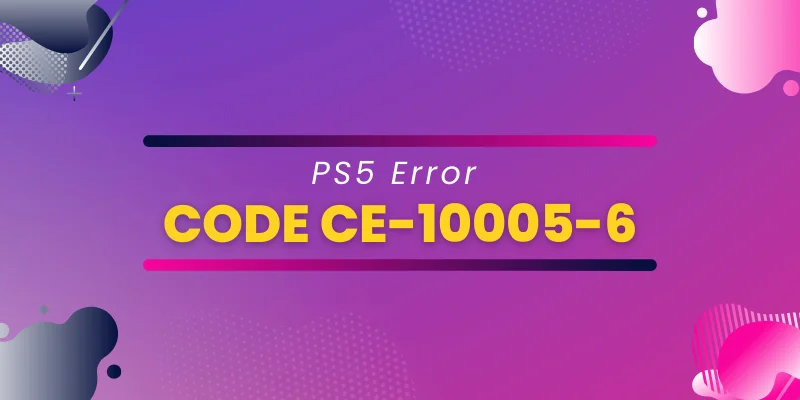


Very informative. (Y)